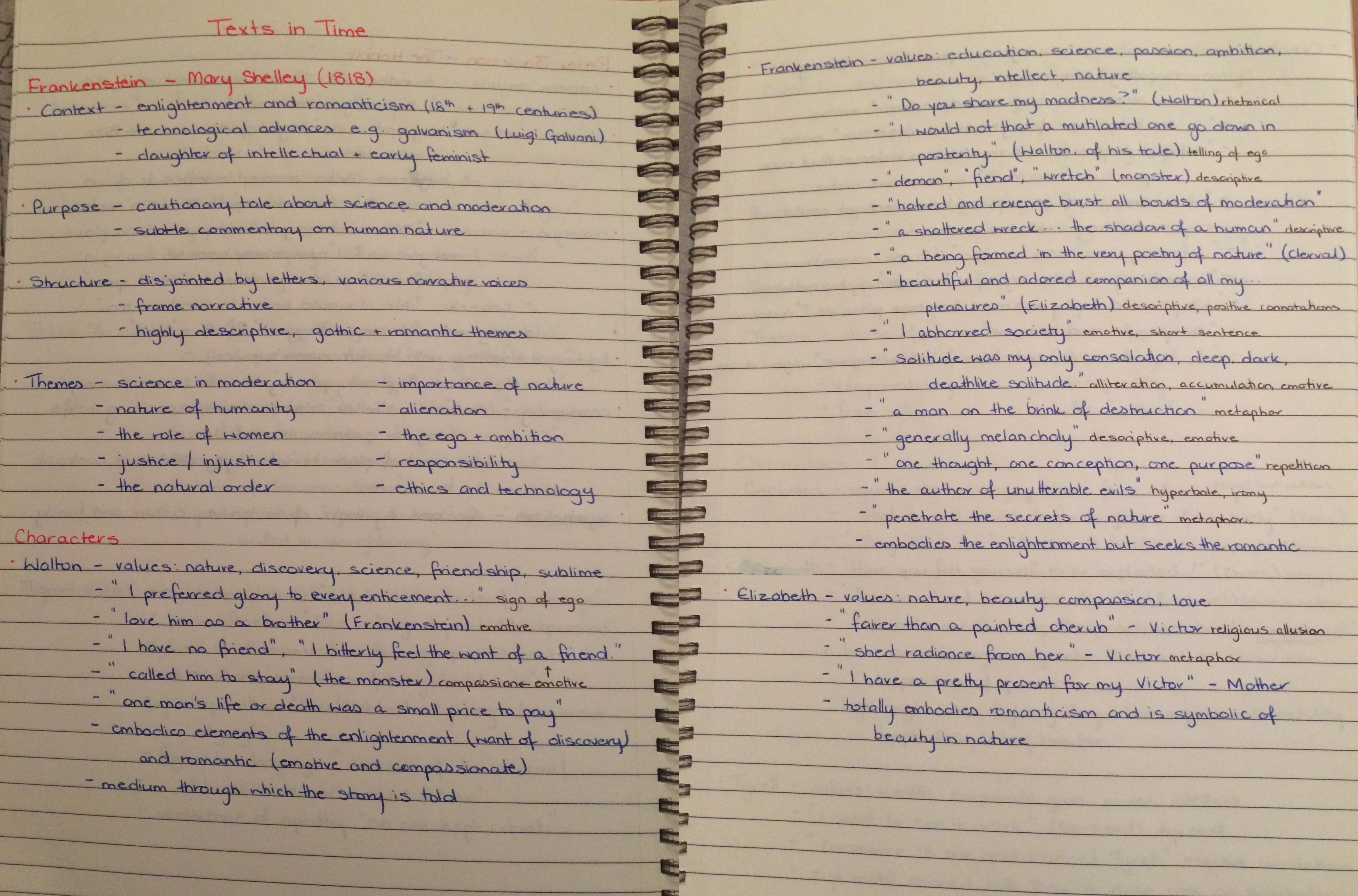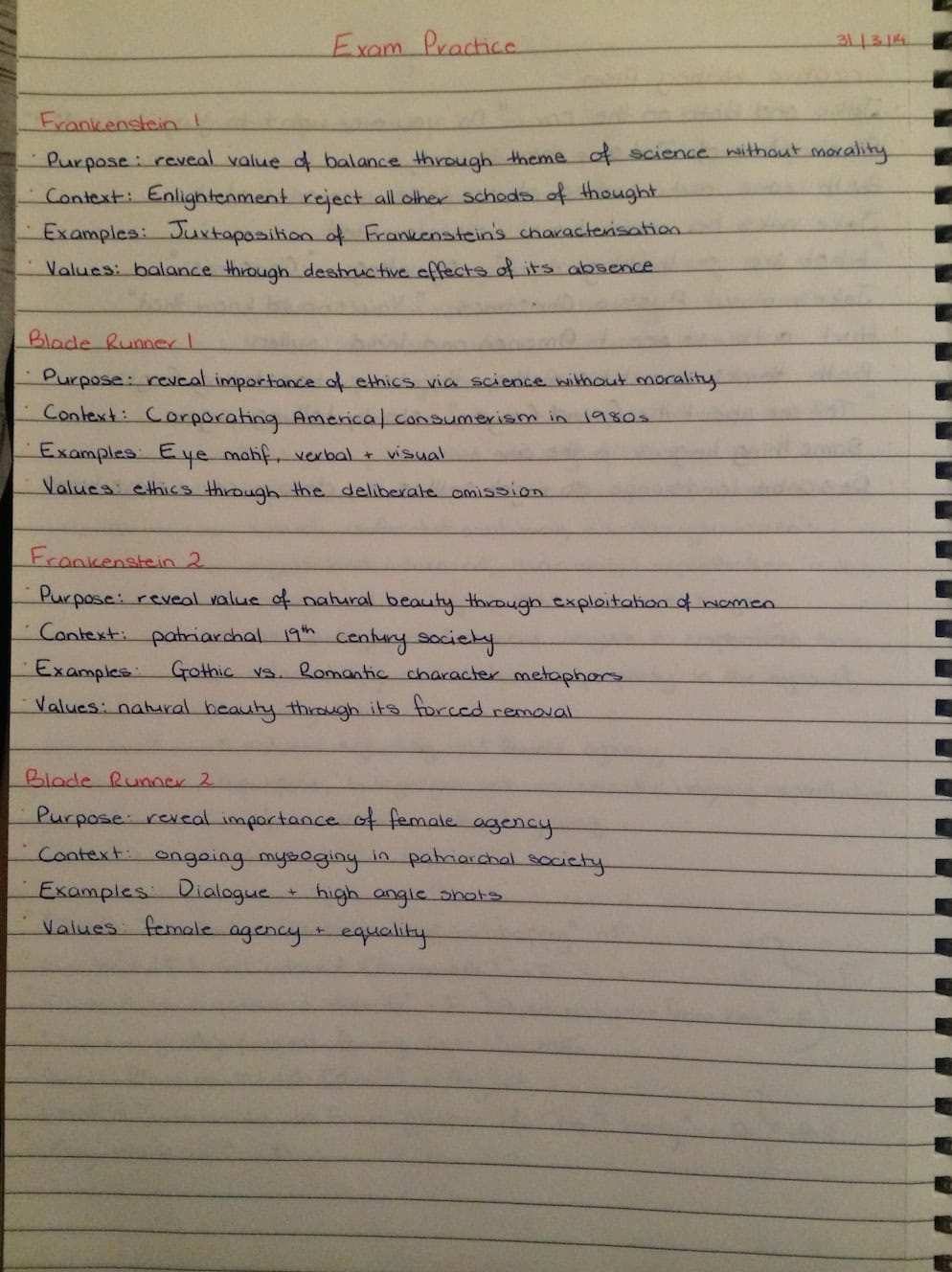There’s a fair bit of debate about whether study notes are better than exam notes and vice versa. Most of the time the arguments come down to the quality of the notes, time spent writing them and ease of memory retention – but there’s actually a lot to consider!
You’ve probably got a few questions already – What are study notes? What are exam notes? How are they different? Which one is best for me?
Luckily in this article, we’ll be explaining exactly just that!
So, let’s dive in!
Study Notes: The Basics
Exam Notes: The Basics
Study Notes: Pros and Cons
Exam Notes: Pros and Cons
How Do I Choose?
Study Notes: The Basics
Generally study notes are notes made progressively throughout a topic, term or even year. They tend to be pretty long, in-depth and cover all of the information learned. The key indication that a set of notes are study notes is that they cover everything – key points and concepts, class work, extra information and general learning. They also usually go into the same amount of detail on every topic. This is why they tend to get so long.
This is what a typical spread of study notes could look like. Note that there’s a whole lot of information spread equally across the ideas/topics – and these are only two pages of a whole book of notes.
Exam Notes: The Basics
On the other hand, exam notes are all about prioritising information and working to a time schedule. These notes are usually focused on key ideas, using brief points, mind maps and shorthand to quickly express topics. Usually exam notes are much shorter and will only focus on one or two topics of study, typically the ones about to be tested on. Exam notes are almost always concise, to the point and cut out any information that isn’t absolutely essential.
These exam notes are pretty good examples. They’re brief, include diagrams to quickly explain concepts and don’t have any superfluous info.
So What’s The Debate?
Essentially there are three big opinions out there…
- people who say study notes work best
- people who say exam notes work best
- people who say they work best together
There are also some people who claim that the two styles are actually the same and can be used interchangeably, but that’s generally not the case. Because of the differences between exam and study notes, trying to make one set of notes fit both styles will usually only end in notes of poor quality.
So, striking that off the list we’re left with our three main opinions. As usual, the only way to decide for yourself is to look at all the different sides of the argument, so let’s check it out!
Study Notes: Pros and Cons
“I am someone who likes to make study notes as I go so that my time leading up to an exam is not just the basic note taking phase which is just a regurgitation of the textbook.” – Jasmine, 97.6 ATAR
Pros
Covers it all – we’ve said it twice already, but study notes cover everything. From the timeline of the First World War to fun facts about sandwiches in Austro-Hungary, these notes should include almost every piece of information you’ve learned about a certain topic. This makes them exhaustive and guarantees that any information you need later on will be in one place, ready for revision.
Detailed – because you cover all information and ideas with equal involvement, these notes almost always end up being incredibly detailed. This means that, no matter the topic, you have more than enough information to understand not only the key ideas/concepts but also why they are key to the subject.
Gradual build up – the scope of this style means that you have to be constantly adding to them, but that’s actually a benefit! Because you’re writing them over an extended timeframe you’re actually able to write in smaller chunks, meaning that spending 1-2 hours a week on study notes can easily get you through.
Cons
Long – this is a double-edged sword. Long notes means covering everything but it also makes it much harder to find specific information and digest whole topics quickly. It also means that your notes could end up becoming too long – making them useless if you don’t have enough time to actually study them.
Not prioritised – covering all information equally means no prioritising and therefore very little indication of what is and isn’t important. This makes it much harder to quickly identify key themes and ideas, which in turn makes them harder to study.
Long-term dedication – as mentioned above, you’ll only need to put in a few hours a week to build up great study notes. But at the same time this means you have to commit to constantly adding to them – the second you slack off information is going to start piling up and make it way harder for you to get back into regular note making.
Exam Notes: Pros and Cons
“Every subject varies but I believe there are some crucial steps… cut down your study notes to the basics.” – Jessica, 94.35 ATAR
Pros
Better memory retention – the fact of the matter is that shorter, summarised notes are going to be infinitely easier to remember than long ones. This means that you have less information to study and therefore more ‘space’ in your brain for the important stuff.
Prioritised – because your notes focus on only the key ideas and information they’re automatically prioritised. By cutting out useless information or things that you already know by heart you make it far easier to remember the information you’re actually going to need – plus, you’ll remember exactly why that information is so important.
One-time writing – not having to add to your notes every week is something most students love. Because exam notes are specific to certain topics or upcoming assessments, you only have to make them when you actually need them. It may mean working for 6 hours instead of 2, but one 6 hour note session is usually more palatable than 2 hours every week.
Cons
May not be reusable – frankly, the notes and information are topic and exam specific, meaning that unless you have a test on exactly the same content, you can’t use these notes again. Study notes contain so much information that they always end up coming in handy again – exam notes? Not so much.
Concise vs brief – while we all know exam notes are shorter, don’t confuse being concise for being too brief. Summaries should be based on what you already know and should simplify the topic to its key ideas, but too often students just write a few over-simplified dot points about a topic and hope for the best. This never works.
Forgetting – frankly, while these notes are great for pre-exam study, you’re probably going to forget them in the long run. This means that if you end up needing the information again for a later assignment or exam, the notes probably won’t have enough information to actually be of any use to you, whereas study notes would.
Using Both: Pros and Cons
“I would recommend breaking down the information you’ve learnt in class each English lesson. Closer to the exam, I would make a very condensed version of all those notes… to refresh my memory.” – Kiandra, 94.65 ATAR
Pros
Best of both worlds – using both styles means that you get the benefits of both exam and study notes! You have stockpiled information notes as well as another set of concise, prioritised notes. Essentially they cancel out each other’s cons.
Choose based on needs – because you can write or have already written notes of both styles, it’s easy to choose which to study from based on the task. If you have a yearly exam coving all topics hit the study notes for all the info. If it’s just a topic-test grab those exam notes instead.
One makes the other – essentially your method should be to create study notes over time, then create exam notes based on those study notes when you need. Essentially your exam notes just end up being awesome, prioritised, summarised versions of your study notes. Plus, because you’re rewriting the information, you’re much more likely to remember it.
Cons
More work – there’s the deal-breaker. Most students hear the phrase ‘more work’ and run for the hills, and there’s no denying that building up two sets of notes in two different styles is definitely going to mean putting in more effort.
More time – and here’s the second part; more work = more time. So yeah, you’re going to be doing 2 hours of study notes weekly, plus 6 hours of exam notes whenever you need them. It sucks, but cutting down time will only reduce the quality of your notes.
If one sucks the other will too – because your exam notes are based on your study notes, it’s super important that your study notes are awesome. If they’re not up to scratch it’s just going to reflect on your exam notes, leaving you with two sets of ‘meh’ notes that aren’t going to be much help.
How Do I Choose?
Having read the pros and cons of each different style, you probably already have some idea about which style you’d prefer to use. If you’re not sure, or you want to check anyway, here’s a helpful quiz to figure out what style might suit you best!
How good are you at summarising on the go?
- Nope
- Yeah!
- No idea?
Would you rather work in:
- Small increments over a long time
- One big effort every now and then
- I don’t mind!
Long notes or short notes?
- Long
- Short
- Doesn’t matter
Is your memory:
- Great for lots of info at once
- Better with key info and ideas
- Both? Neither? I’m not sure!
Do you prefer your notes in-depth or concise?
- In-depth!
- Concise!
- Anything goes for me
Now tally up your answers and see if you have mostly ones, twos or threes:
- If you picked 1’s the most you’ll do well with study notes.
- If 2’s were your most common pick exam notes will probably be your thing.
- And if you were sticking to 3’s you can do both or either!
That all being said, the choice is ultimately yours and only you can decide what style will or won’t work for you.
Looking for a better way to organise your online study or exam notes? Check out our HSC Notion Template, which includes a syllabus dot points to follow for each of your subjects, an assessment planner, habit tracker, past papers, and more!
The Verdict
As with most debates, at the end of that day it comes down to personal preference and opinion. Some people just can’t sustain note writing over long periods and therefore loathe making study notes, whereas others don’t want the pressure of writing exam notes. What is most important is how you work and what you want to achieve from your notes.
Personally, I always used both styles, building up study notes over time and then condensing them into exam notes whenever I needed them. Even though it worked great for me, I know a lot of other people would find it tedious of ineffective, so go with what works for you.
So which style are you going to choose?
Always falling behind on your study notes? Start using these 4 HSC Classroom Strategies to get back on track!
Looking for some extra help with the HSC?
We have an incredible team of HSC tutors and mentors who are new HSC syllabus experts!
We can help you master the HSC syllabus and ace your upcoming HSC assessments with personalised lessons conducted one-on-one in your home or at our state of the art campus in Hornsby!
We’ve supported over 5,000 students over the last 10 years, and on average our students score mark improvements of over 19%!
To find out more and get started with an inspirational HSC tutor and mentor, get in touch today or give us a ring on 1300 267 888!
Maddison Leach completed her HSC in 2014, achieving an ATAR of 98.00 and Band 6 in all her subjects. She enjoys helping students through the academic and other aspects of school life, even though it sometimes makes her feel old. Maddison has had a passion for writing since her early teens, having had several short stories published before joining the world of blogging. She’s currently studying a Bachelor of Design at the University of Technology Sydney and spends most of her time trying not to get caught sketching people on trains.





